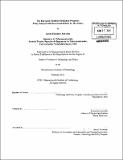The European Satellite Navigation Program : policy analysis and recommendations for the future
Author(s)
Escudero San José, Laura
DownloadFull printable version (14.17Mb)
Other Contributors
Massachusetts Institute of Technology. Technology and Policy Program.
Advisor
Richard de Neufville.
Terms of use
Metadata
Show full item recordAbstract
The European Satellite Navigation Program is a case study that combines Technical / Public / Private aspects in an integrative way. Therefore, it is a sound case for a TPP thesis candidate. This thesis analyzes the European Union policies for the Galileo program, Europe's bid to have its own Global Navigation Satellite System (GNSS). Galileo is the Europe's first major attempt to develop a complex, Pan-European infrastructure project, to be owned by the European Union. It challenges its capability to gather strength and achieve the political capability to deal with major technology policy projects to lead in world affairs. It is a unique case that serves as a precedent for further infrastructure/technical projects to be managed by European Union institutions in the future. Such a major technology policy project involves the interrelation of a complex structure of multinational political and industrial organizations, and the interrelation of leading edge technical, economic, commercial and social concerns in the heart of the European Communities. During the last two decades Europe has committed to maintain a remarkable long-term vision and a strong political determination to developing Galileo. On the downside, the EU hashad difficulties in establishing a coherent financing program and a punctual manufacturer deployment. On the basis of the Galileo endeavor,this thesis assesses the use of Public Private Partnerships in large pan-European infrastructure projects in the complex political framework of the European Union. This analysis is performed upon the perspective of a theory of how to devise a strategy, a tactical plan, and a way to implement a technology policy effectively, developed by the guidelines set forth by the MIT Technology and Policy Program. It reviews the history of the European Union's policies attempting to develop Galileo, evaluates the strengths and weaknesses of such policies, and delivers a plan and a guide to help implement future projects more effectively. Finally, it aims to provide a set of recommendations for the future policymaking the European Union will face in the next decades with regard to the operation and exploitation of the system.
Description
Thesis (S.M. in Technology and Policy)--Massachusetts Institute of Technology, Engineering Systems Division, Technology and Policy Program, 2011. Cataloged from PDF version of thesis. Includes bibliographical references (p. 143-148).
Date issued
2011Department
Massachusetts Institute of Technology. Engineering Systems DivisionPublisher
Massachusetts Institute of Technology
Keywords
Engineering Systems Division., Technology and Policy Program.